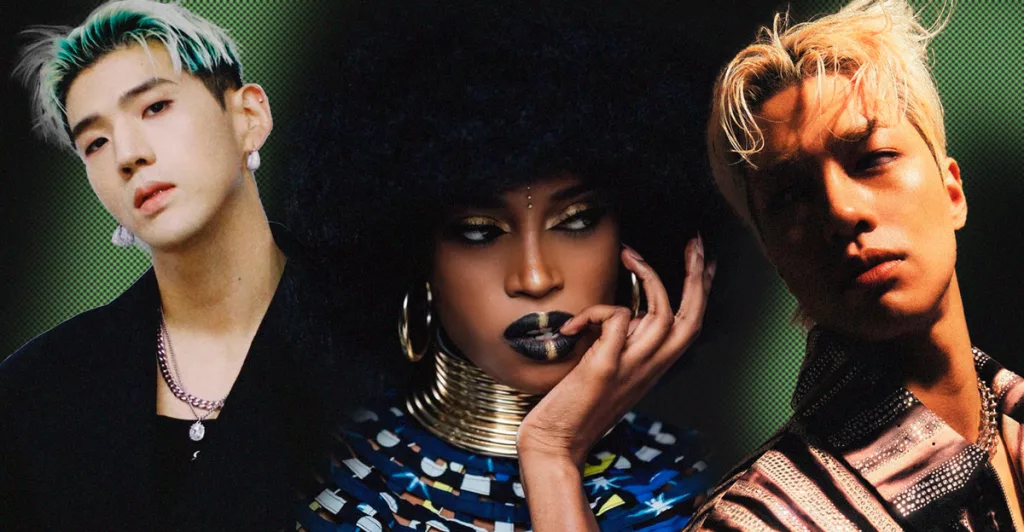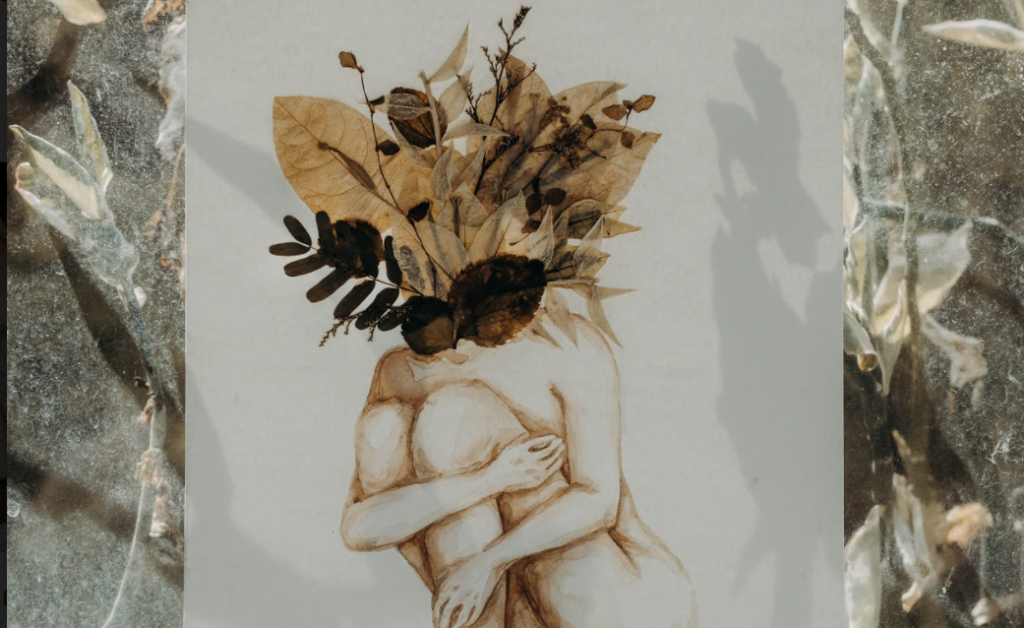8 Artists in the Korean Music Scene Who Tapped Into Afrobeats in 2023

In Korean pop, variety is the spice of life. The South Korean music scene encompasses various music genres, including pop, hip-hop, R&B, jazz, and reggae. Its unique sound is the result of a fusion of diverse sonic influences across various cultures, including West Africa. This is evident, for example, in the 2021 tracks “BOLO” by PENOMECO and Lil Cherry‘s “PYE LIFE,” which was produced by the renowned Nigerian soundsmith LONDON.
However, with African genres (Afrobeats, Afropop, and Amapiano) earning global acclaim recently, 2023 saw an influx of Afrobeats-influenced releases. EnVi brings you eight artists in the Korean music space who tapped into Afrobeats trends for their releases.
TXT
TOMORROW X TOGETHER kicked off the 2023 K-pop Afrobeats trend with “Tinnitus (Wanna be a rock).” Released on January 27, The Name Chapter: Temptation B-side boasts an Afropop-inspired rhythm. Its instrumental is full of African percussion and tones. “I would say there is a subtle blend of dancehall in there with that two-step melody and a touch of R&B,” explained Ghanaian music consultant Ian Priceless to EnVi. He added, “This song is something Davido or Wizkid will do.”
With lyrics co-written by TXT members YEONJUN and TAEHYUN, “Tinnitus” features production from Spanish record producer Smash David, known for hits such as “Location” by Khalid and “Bounce Back” by Big Sean. Dystinkt Beats also participated in the production of “Tinnitus,” making it his second African sound-inspired song after the 2022 song “Sad Boys Don’t Fold” by Ghanaian rapper Black Sherif.
TXT diving into Afrobeats reflects the love TAEHYUN has for the genre. For the 2022 Weverse artists‘ holiday playlist, he recommended “Essence” by Nigerian artists Wizkid and Tems. Furthermore, in an interview with Apple Music, he mentioned Wizkid as his ideal collaboration.
“I’m really into the Afropop genre these days, like Tems, Wizkid, and TOMORROW X TOGETHER,” Taehyun said shortly after the release of “Tinnitus.” Speaking on the creative process, he disclosed that the members were excited about trying out the new genre. He also added that they were extra careful while working on the track, as a misstep could ruin the vibe and quality of the song.
Nine months after “Tinnitus,” TXT released another Afrobeats song titled “Back For More,” a collaboration with Brazilian singer Anitta. The quintet released various versions of the original track, including an Afrobeats version. The Afrobeats remix features a chill-like Afro rhythm with lively percussion and dreamy synth sounds.
NCT 127
On October 6, NCT 127 dropped “Fact Check,” the title track from their fifth album of the same title. While “Fact Check” stayed true to NCT 127’s experimental sound, it featured an intense main synth loop and afro rhythm. With an infectious hook, “Fact Check” seamlessly incorporates the hallmark three- or five-step melody pattern of highlife/Afrobeats. It marks an upgrade from their 2020 track, “Music, Dance,” which was tagged as an Afrobeat dance song but blended pop with R&B.
Among the Afrobeats-influenced K-pop releases of 2023, “Fact Check” stands out for its choreography, which incorporates West African dance steps. Co-choreographed by TAEYONG, the group’s leader, “Fact Check” features Chaskele (chas-kay-lay) and Network from Ghana and Happy Feet from Nigeria. According to Taeyong, he crafted the dance moves in an hour and loved every part of the process.
Taeyong is no novice to Afrobeats dance steps. Aside from the gwara gwara, which was featured in NCT 127’s 2020 title track, “Kick It,” Taeyong has co-choreographed the SMTOWN collaborative track “ZOO,” which incorporated the Ghanaian dance move, Network.
“I like Afrobeats, and I was lucky to be able to participate in the choreography,” Taeyong said during the showcase ahead of “Fact Check’s” release. His members also praised him for the choreography, stating he “created a new choreography that surpassed the original version.”
Fatou
BLACKSWAN member Fatou tapped into her African heritage for her debut EP, Letter 1 – Adaeh. From the title of the mini album to the official EP artwork to its sound, the Senegalese-Belgian idol sought inspiration from her birth continent, Africa.
Kicking off with the EP’s title, Adaeh is a girl’s name of African origin that means “crowned,” “chosen,” or “pinnacle of a peak.” In addition to choosing an EP title symbolic of her culture, Fatou integrated African cultural elements into the overall aesthetics. The album cover features Fatou looking regal as she rocked an Ankara Fringe necklace and an Afro wig. Fatou complemented her regal look with a gold choker necklace, bangle bracelets, and black lipstick with a touch of gold.
In addition, she experimented with African sounds on four out of the five tracks on the self-composed mini album. The first track, “The Other Side,” sees Fatou blend hip-hop and jazz with faint percussions and maracas, which are highlighted in the first part of the song. On the next track, “Devil Made the Deal for Me,” Fatou seamlessly fuses hip-hop with elements of highlife and palm-wine music that are indigenous to West Africa. The African drums and percussion stand out as key features in the English rap song.
The third track, “Adaeh,” does not feature any African influence, but its title pays homage to African culture. The last two songs, “Me myself and I” and “Alright,” are heavy Afrobeats tunes. “Me, myself, and I” is a dance-y tune with percussion that resonates throughout the song. The infectious rhythm of “Alright,” the last song on the mini album, is enhanced by the profound drum kicks.
Jay Park
“If you did not know who Jay Park was, you would have thought it was a Nigerian or a Ghanaian singing towards the end of the song,” Yaw Boadu-Ayeboafoh, a Ghanaian music executive, told EnVi. This was a reaction to the South Korean artist’s latest multi-genre single, “Why.” Produced by his frequent collaborator, Cha Cha Malone, “Why” features a house instrumental from the beginning until the 2:05 stamp. From there, the song transitions into Afrobeats, with Cha Cha Malone’s producer tag “I Need A Cha Cha Beat Boy,” serving as the transition point.
In the latter part of the song, an unmistakable bounce emerges, embodying the signature rhythm that characterises Afrobeats. Cha Cha Malone is the brain behind the Afrobeats switch-up in “Why.” Jay Park disclosed on Power 106 that the American producer had been “working on a lot of Afrobeats these days.” Explaining the creative process, the Korean-American singer said he felt the need for a switch-up in the song. This resulted in Cha Cha sampling their previous collaboration, “Solo,” and adding the Afrobeats-induced beat.
“Why” is not Jay Park’s first exploration of Afrobeats. In 2018, he teamed up with his Roc Nation labelmate, Young Paris, on the song “Girls Wanna Party.” The collaboration was off the album MY TRIBE, which is dedicated to music lovers who vibe to the global sound of Afrobeats. Upon the release of “Why,” many music fans flooded the comments section of the music video with praise for the artist.
BM
Big Matthew of the Korean co-ed group KARD had a double run with Afropop in 2023. His first project was “Been That Boy” with fellow KARD member J.Seph, a subunit track from the group’s sixth mini album, ICKY. Both members contributed to the writing of “Been That Boy,” which represented a return to their hip-hop roots and allowed the group to showcase their various rap styles. In addition to the confident lyrics that resonate throughout the song, a standout feature is its “Afropop influence,” as pointed out by BM during an interview with EnVi.
His second experiment with Afropop was on his solo project “Lowkey,” released in November 2023. BM had artistic liberty while crafting “Lowkey,” as he contributed to the track as the writer, composer, and arranger. Speaking to fans during a livestream, he mentioned being influenced by the type of music he enjoys listening to.
To BM, the creative process for “Lowkey” was easy. The beat and hook came quickly to him, as the song’s vibe is what he describes as natural to him. Speaking on what informed his decision to try Afropop, he said, “I’ve been stuck on Afropop. I love Afropop these days.”
BM’s recent love for Afropop is no surprise to anyone who follows the rapper on X (formerly Twitter). In June, he posted a Spotify screenshot of the remix to “People” by Cameroonian singer Libianca, featuring Nigerian artists Omah Lay and Ayra Starr. BM’s next Afropop-related post was in September when he declared his love for the genre and asked his followers to recommend artists to listen to.
“There’s something about Afropop that just makes you groove a certain way,” BM remarked about the genre. With plans to create more Afropop tunes, BM revealed he had two Caribbean producers whose opinions he holds in high esteem. Having met them while working on songs for KARD at a songwriting camp, BM revealed he played “Lowkey” for them and will seek their opinion for future releases. “I wanna do it properly; I don’t want to disrespect the culture,” he stated.
3YE
After a year and seven months of no releases, K-pop trio 3YE made a comeback with the Afrobeats-inspired “LOCO.” The drum pattern, mainly the snare and kick foundation used in Afrobeats, grabs the listeners’ attention immediately, commented Ghanaian radio producer Raven Kuewor. “I like how the chord progressions progress smoothly side by side with each melody, giving it that swing,” she said in a chat with EnVi. “Automatically, the combination of the snare paired with the chords and harmonies caught my attention,” she added.
Released on November 16, “LOCO” saw 3YE try out a softer and more feminine concept than previous releases such as “YESSIR” and “DMT (Do Ma Thing).” In a documentary detailing the creative process of “LOCO,” YUJI, the group’s leader, recalled liking the demo at first listen since it was a concept they had never tried before.
“When I first heard it, it was a very mysterious and dreamy concept,” she explained in the documentary. “But since the beat is an Afrobeat, we were able to incorporate some of our strengths in performances,” she stated. YURIM, on the other hand, experienced a little difficulty due to the novelty of the concept. “It was my first time doing that kind of afro, so it was difficult,” she admitted. For the youngest member, HAEUN, trying out a new concept led them to be more involved in the creative process. “We discussed our opinions a lot for this comeback,” she said.
According to their documentary, “LOCO” was made in six months. On May 26, the trio arrived at their agency, where they heard the demo for the first time. Upon hearing it, YUJI expressed concern about how they would interpret it, considering the demo was sung by a man. After hearing the demo, the group began to immerse themselves in the Afrobeats culture, including Yuji doing a dance cover of Rema‘s “Calm Down” that featured fellow Triple Seven member Gunmin.
GEMINI
“I wanted to try a genre many people are now listening to, so I started making Afrobeat songs,” GEMINI said about his eight-track album, Love Sick. Released on September 22, the album consists of four songs that pay homage to Afrobeats. The second song on the album, “Body On Me,” is the first Afrobeats-influenced song. The song features PENOMECO, who released an Afrobeats EP titled Organic in 2021.
Speaking on his decision to collaborate with PENOMECO, GEMINI recalled looking for Korean artists who dabble in Afrobeats and then remembered “BOLO.” “I immediately messaged PENOMECO, and luckily, he agreed to participate,” he said about the collaboration during an interview.
The next Afrobeats song and most Afrobeats-centric song on Love Sick is the remix of his debut song, “Going.” The original, released in November 2020, is a chill and sentimental R&B song. For the Afrobeats remix, GEMINI incorporated house music with Afrobeats. A notable element of the remix is its mellow chords, the shakers, and the Amapiano undertones scattered across the song.
The other songs on the album with Afrobeats influences are “Know Me Remix” and “Run It Back.” According to GEMINI, he drew inspiration from the Nigerian singer Rema, known for the Billboard charting song “Calm Down.”
Kohway
Since 2018, Kohway has carved a unique path for himself by fusing hip-hop, alté, and Afrobeats. Over the years, the South Korean rapper has dabbled in Afrobeats, collaborating with Korean artists and South Korea-based African acts. The rising artist has also immersed himself in African culture by learning to play African drums. He has covered songs from renowned Nigerian artists such as Wizkid and Ladipoe. Kohway’s cultural immersion was not limited to just music but also extended to food and Nigerian slang.
Staying true to his sound, Kohway teamed up with Korean hip-hop and R&B singer Niaeh for a joint EP, AFRO TAPE. The five-track mini album consists of three original songs: “Run Away,” “Miss You Bad,” and “Let Me Know.” It includes sped-up versions of “Run Away” and “Let Me Know.” On the Jay Dope-produced AFRO TAPE, Kohway and Niaeh experiment with Amapiano on “Run Away,” which marked a new territory for both artists. The other songs, “Miss You Bad” and “Let Me Know,” lean towards Afrobeats with heavy percussion instruments.
Want to read more about K-pop tapping inspiration from other cultures? Check out EnVi’s breakdown of K-pop stars betting on Spanish tracks here!



